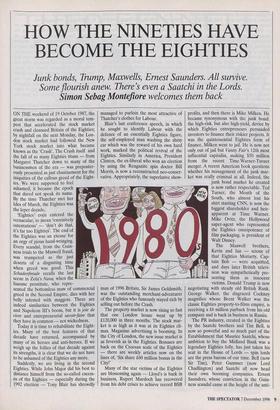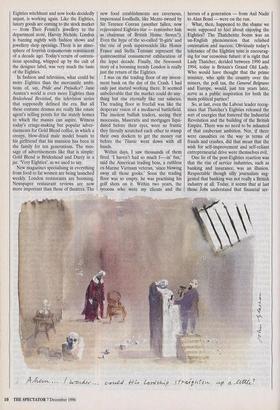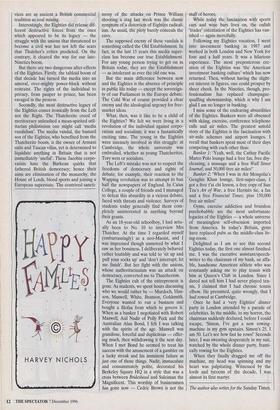HOW THE NINETIES HAVE BECOME THE EIGHTIES
Junk bonds, Trump, Maxwells, Ernest Saunders. All survive.
Some flourish anew. There's even a Saatchi in the Lords.
Simon Sebag Montefiore welcomes them back ON THE weekend of 19 October 1987, the great storm was regarded as a moral tem- pest that accelerated the stock market crash and cleansed Britain of the Eighties; by nightfall on the next Monday, the Lon- don stock market had followed the New York stock market into what became known as the 'Crash'. The Crash itself and the fall of so many Eighties titans — from Margaret Thatcher down to many of the businessmen of the era — was preposter- ously presented as just chastisement for the iniquities of the callous greed of the Eight- ies. We were supposed to feel ashamed; it became the epoch that dared not speak its name. By the time Thatcher met her Ides of March, the Eighties was the leper decade. 'Eighties' even entered the vernacular, to mean 'excessively ostentatious' — 'don't do that, it's far too Eighties'. The end of the Eighties was an excuse for an orgy of pious hand-wringing. Every scandal, from the GuM- ness trials to the Maxwell fraud, was trumpeted as the just deserts of a disgusting time when greed was good. This Sehadenfreude recalls the last scene in Zola's Nana, when the lissome prostitute, who repre- sented the bottomless maw of commercial greed in the Second Empire, dies with her belly infested with maggots. There are indeed similarities between the Eighties and Napoleon III's boom, but it is joie de vivre and entrepreneurial savoir-faire that they have in common — not wickedness.
Today it is time to rehabilitate the Eight- ies. Many of the best features of that decade have returned, accompanied by many of its heroes and anti-heroes. If we weigh up the follies of that decade against its strengths, it is clear that we do not have to be ashamed of the Eighties any more.
.Suddenly, we are living in the second Eighties. While John Major did his best to distance himself from the so-called excess- es of the Eighties — especially during the 1992 election — Tony Blair has shrewdly managed to purloin the most attractive of Thatcher's clothes for Labour.
Blair's last conference speech, in which he sought to identify Labour with the defence of an essentially Eighties figure, the self-employed man washing the shiny car which was the reward of his own hard work, marked the political revival of the Eighties. Similarly in America, President Clinton, the ex-liberal who won an election by using the Reaganite spin doctor Bill Morris, is now a reconstructed neo-conser- vative. Appropriately, the superlative show- man of 1996 Britain, Sir James Goldsmith, was the outstanding merchant-adventurer of the Eighties who famously stayed rich by selling out before the Crash.
The property market is now rising so fast that one London house went up by £120,000 in three months. The stock mar- ket is as high as it was at its Eighties cli- max. Magazine advertising is booming. In the City of London, the new issue market is as feverish as in the Eighties. Bonuses are back on the Croesan scale of the Eighties — there are weekly articles now on the lines of, 'Six share £60 million bonus in the City!'
Many of the star victims of the Eighties are blossoming again — Lloyd's is back in business, Rupert Murdoch has recovered from his debt crises to achieve record BSB profits, and then there is Mike Milken. He became synonymous with the junk bond: the high-risk, but also high-yield, device by which Eighties entrepreneurs persuaded investors to finance their riskier projects. It was the quintessential Eighties form of finance. Milken went to jail. He is now not only out of jail but Vanity Fair's 12th most influential capitalist, making $50 million from the recent Time Warner-Turner merger. A recent American book questions whether his management of the junk mar- ket was really criminal at all. Indeed, the junk bond market he created is now rather respectable. Ted Turner, the Mouth of the South, who almost lost his shirt starting CNN, is now the biggest shareholder and heir- apparent at Time Warner. Mike Ovitz, the Hollywood super-agent who represented the Eighties omnipotence of film packaging, is president of Walt Disney.
The PR industry, created in the Eighties by the Saatchi brothers and Tim Bell, is now so powerful and so much part of the Establishment that Maurice Saatchi, whose ambition to buy the Midland Bank was a legendary Eighties folly, has just taken his seat in the House of Lords — spin lords are the press barons of our time. Bell (now Sir Tim), Peter Gummer (now Lord Chadlington) and Saatchi all now head their own booming companies. Ernest Saunders, whose conviction in the Guin- ness scandal came at the height of the anti- Eighties witchhunt and now looks decidedly unjust, is working again. Like the Eighties, luxury goods are coming to the stock market — from Theo Fennel's jewellery to the department store, Harvey Nichols. London is buzzing nightly with fashion shows and jewellery shop openings. There is an atmo- sphere of feverish consumerism reminiscent of a decade ago. Today's return of ostenta- tious spending, whipped up by the cult of the designer label, was very much the taste of the Eighties.
In fashion and television, what could be more Eighties than the mercantile ambi- tions of, say, Pride and Prejudice? Jane Austen's world is even more Eighties than Brideshead Revisited, the television series that supposedly defined the era. But all these costume dramas are really like estate agent's selling points for the stately homes to which the masses can aspire. Witness today's cringe-making but popular adver- tisements for Gold Blend coffee, in which a creepy, blow-dried male model boasts to his girlfriend that his mansion has been in the family for ten generations. The mes- sage of advertisements like that is simple: Gold Blend is Brideshead and Darcy in a jar. 'Very Eighties', as we used to say.
New magazines specialising in everything from food to fat women are being launched weekly. London restaurants are booming. Newspaper restaurant reviews are now more important than those of theatres. The new food establishments are cavernous, impersonal foodhalls, like Mezzo owned by Sir Terence Conran (another fallen, now rejuvenated Eighties star — remember him as chairman of British Home Stores?). Even the hype of the so-called 'It-girls' and the rise of posh supermodels like Honor Fraser and Stella Tennant represent the quintessential consumerist exhilaration of the leper decade. Finally, the Newsweek story of a booming trendy London is really just the return of the Eighties.
I was on the trading floor of my invest- ment bank on the day of the Crash. I had only just started working there. It seemed unbelievable that the market could do any- thing but rise eternally like our salaries. The trading floor in freefall was like the desperate vision of a mediaeval battlefield. The insolent bullish traders, seeing their moccasins, Maseratis and mortgages liqui- dated before their eyes, were so frantic they literally scratched each other to stamp their own dockets to get the money out before the Titanic went down with all hands.
Within days, I saw thousands of them fired. 'I haven't had so much f—in' fun,' said the American trading boss, a ruthless ex-Marine Vietnam veteran, 'since blowing away all those gooks.' Soon the trading floor was so empty, he was practising his golf shots on it. Within two years, the tycoons who were my clients and the heroes of a generation — from Asil Nadir to Alan Bond — were on the run.
What, then, happened to the shame we were supposed to feel about enjoying the Eighties? The Thatcherite boom was an un-English phenomenon that relished ostentation and success. Obviously today's tolerance of the Eighties tone is encourag- ing for our economic future: it is right that Lady Thatcher, derided between 1990 and 1994, today is Britain's Grand Old Lady. Who would have thought that the prime minister, who split the country over the miners, the poll tax, the General Belgrano and Europe, would, just ten years later, serve as a public inspiration for both the main political parties?
So, at last, even the Labour leader recog- nises that Thatcher's Eighties released the sort of energies that fostered the Industrial Revolution and the building of the British Empire. There was no need to be ashamed of that exuberant ambition. Nor, if there were casualties on the way in terms of frauds and crashes, did that mean that the wish for self-improvement and self-reliant entrepreneurial drive were themselves evil.
One lie of the post-Eighties reaction was that the rise of service industries, such as banking and insurance, was an illusion. Respectable though silly journalists sug- gested that banking was not really a British industry at all. Today, it seems that at last those Jobs understand that financial ser- vices are as ancient a British commercial tradition as coal mining.
Interestingly, the Eighties did release dif- ferent destructive forces from the ones which appeared to be its legacy — the struggle with the unions that threatened to become a civil war has not left the scars that Thatcher's critics predicted. On the contrary, it cleared the way for our late- Nineties boom.
But there are two dangerous after-effects of the Eighties. Firstly, the tabloid boom of that decade has turned the media into an amoral, over-mighty power-block without restraint. The rights of the individual to privacy, from pauper to prince, has been ravaged in the process.
Secondly, the most destructive legacy of the Eighties comes ironically from the Left not the Right. The Thatcherite creed of meritocracy unleashed a mean-spirited util- itarian philistinism one might call 'media vandalism'. The media vandal, the bastard son of the Eighties, who benefited from the Thatcherite boom, is the owner of Armani suits and Tuscan villas, yet is determined to liquidate anything in Britain that is not immediately 'useful'. These Jacobin corpo- ratists hate the Burkean quirks that fathered British democracy; hence their aims are elimination of the monarchy, the House of Lords, blood sports and joining a European superstate. The contrived sancti- mony of the attacks on Prince William shooting a stag last week was the classic symptom of a distortion of Eighties radical- ism. As usual, the piety barely conceals the envy.
The supposed enemy of these vandals is something called the Old Establishment. In fact, in the last 15 years this media super- class has become our true Establishment. For any young person trying to get on in Britain today, they are the Establishment — as intolerant as ever the old one was.
But the main difference between now and the Eighties is the absence of principle in public life today — except the sovereign- ty of our Parliament in the Europe debate. The Cold War of course provided a clear enemy and the ideological urgency for free- market ideas.
What, then, was it like to be a child of the Eighties? We felt we were living in a revolution of the individual against corpo- ratism and socialism; it was a fantastically exciting time. The young in the Eighties were intensely involved in this struggle: at Cambridge, the whole university was embroiled, whether as young Thatcherites, Tory wets or socialists.
The Left's mistake was not to respect the freedoms of democracy and rights of debate; for example, their reaction to the Wapping revolution was to attempt to ban half the newspapers of England. In Caius College, a couple of friends and I managed to defeat this absurdity in a vicious debate, faced with threats and violence. Surveys of students today generally find them com- pletely uninterested in anything beyond their grants.
As an 18-year-old schoolboy, I had actu- ally been to No. 10 to interview Mrs Thatcher. At the time I regarded myself (embarrassingly) as a neo-Maoist, and I was impressed though unmoved by what I saw as her bossiness. I deliberately behaved rather loutishly and was told to 'sit up and pull your socks up' and 'don't interrupt; let me finish'. But her fight with the unions, whose authoritarianism was an attack on democracy, converted me to Thatcherism.
The Eighties cult of the entrepreneur is gone. As students, we spent hours discussing who we would rather be — Murdoch, Han- son, Maxwell, White, Branson, Goldsmith. Everyone wanted to run a business and bought a filofax from which to govern it. When as a banker I negotiated with Robert Maxwell, Asil Nadir of Polly Peck and the Australian Alan Bond, I felt I was talking with the spirits of the age. Maxwell was grandiose, forceful and duplicitous — offer- ing much, then withdrawing it the next day. When I met Bond he seemed to treat his success with the amusement of a gambler on a lucky streak and his imminent failure as just one of those things. Nadir, immaculate and consummately polite, decorated his Berkeley Square HQ in a style that was a cross between Brideshead and Suleiman the Magnificent. This worship of businessmen has gone now — Cedric Brown is not the stuff of heroes.
While today the fascination with sports cars and wine bars lives on, the oafish 'trader' ostentation of the Eighties has van- ished — again mercifully.
Following my Eighties vocation, I went into investment banking in 1987 and worked in both London and New York for four and a half years. It was a hilarious experience. The most preposterous cre- ation of the Eighties was 'the American investment banking culture' which has now returned. Then, without having the slight- est interest in figures, one could prosper by sheer cheek. In the Nineties, though, pro- fessionalism has replaced champagne- quaffing showmanship, which is why I am glad I am no longer in banking.
I miss some of the endearing absurdities of the Eighties. Bankers were all obsessed with skiing, exercise, conference telephone calls and air miles. The greatest untold story of the Eighties is the fascination with air-mile schemes and airport lounges. I recall that bankers spent most of their days competing with each other thus: Banker 1: 'Yeah, well, the Cathay Pacific Marco Polo lounge had a free fax, free dry- cleaning, a massage and a free Wall Street Journal; and 50,000 free air miles!'
Banker 2: 'When I was in Air Mongolia's Genghis Khan lounge, first-super-class, I got a free t'ai chi lesson, a free copy of Sun Tzu's Art of War, a free Hermes tie, a fax and a free Financial Times; plus 150,000 free air miles!'
Gyms, exercise addiction and brainless psychobabble are the most unfortunate legacies of the Eighties — a whole universe of meaningless self-obsession imported from America. In today's Britain, gyms have replaced pubs as the middle-class liv- ing-room.
Delighted as I am to see this second Eighties today, the first one almost finished me. I was the executive assistant/speech- writer to the chairman of my bank, an affa- ble, handsome American athlete who was constantly asking me to play tennis with him at Queen's Club in London. Since I dared not tell him I had never played ten- nis, I claimed that I had chronic tennis elbow. He presumed, quite wrongly, that I had rowed at Cambridge.
Once he had a 'very Eighties' dinner party in London attended by a parade of celebrities. In the middle, to my horror, the chairman suddenly declared, before I could escape, 'Simon, I've got a new rowing- machine in my gym upstairs. Simon's 25, I am 50. Let's see how fast he rows!' Seconds later, I was sweating desperately in my suit, watched by the whole dinner party, franti- cally rowing for the Eighties.
When they finally dragged me off the machine, my head was spinning and my heart was palpitating. Witnessed by the lords and tycoons of the decade, I was almost its first martyr.
The author also writes for the Sunday Times.




















































































 Previous page
Previous page